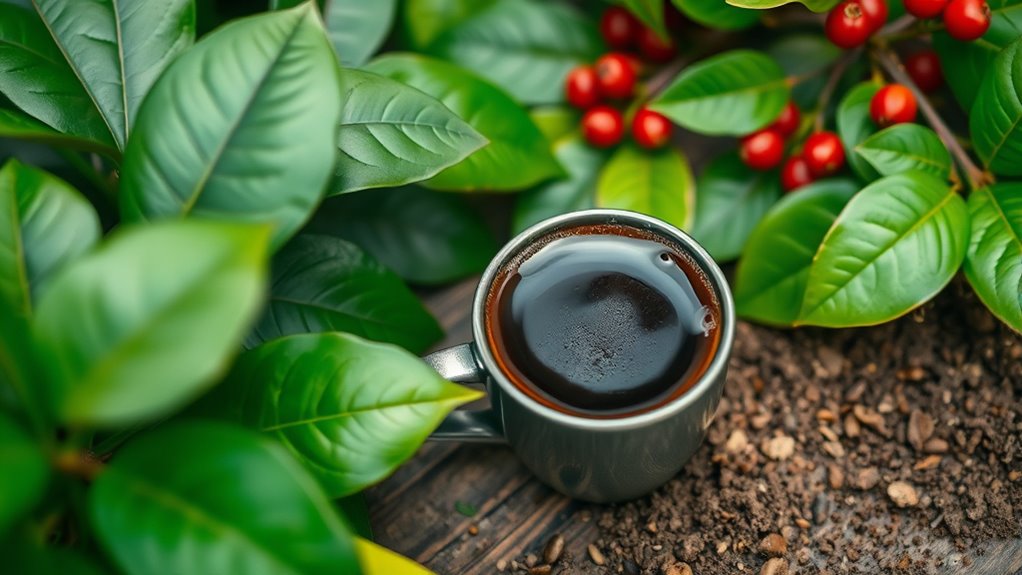Organic standards focus on maintaining healthy, nutrient-rich soils, which directly influence the flavor and authenticity of your beverages. Healthy soils support beneficial microbes and vibrant ecosystems that develop rich, consistent taste profiles. By avoiding synthetic chemicals, organic practices preserve the true essence of the terroir, ensuring genuine flavors that reflect the land. This soil-to-sip approach guarantees a purer, more authentic experience. If you want to uncover how this connection shapes your favorite drinks, keep exploring how organic standards make a difference.
Key Takeaways
- Organic standards promote healthy soil, which enhances terroir and contributes to distinctive, authentic flavor profiles.
- Healthy soils support consistent plant growth, leading to reliable and stable flavor expression across harvests.
- Reduced chemical use in organic farming preserves natural crop essence, resulting in purer, more authentic flavors.
- Organic practices foster microbial diversity and soil vitality, enriching flavor development in the final product.
- The soil-to-sip approach connects consumers to the land’s unique environment, ensuring flavor reflects specific terroir influences.

When you sip an organic coffee or tea, you’re tasting more than just the beverage—you’re experiencing the direct influence of soil health and farming practices. Organic standards emphasize healthy, nutrient-rich soil, which plays a vital role in shaping the terroir influence on your drink. Terroir, a French term often associated with wine, describes how the unique combination of soil, climate, and terrain impacts flavor. In organic farming, the focus on maintaining soil vitality through composting, crop rotation, and natural amendments guarantees that the plants develop their true character. This connection between soil health and plant development means that every harvest reflects the specific terroir, giving you a distinctive flavor profile that’s rooted in the land. As a result, organic coffees and teas often display a more pronounced sense of place, allowing you to taste the nuances of the environment where they were grown.
In addition to enhancing terroir influence, organic farming practices contribute to flavor consistency. Conventional agriculture sometimes relies on synthetic fertilizers and pesticides, which can cause fluctuations in flavor from one batch to another. Organic standards restrict these inputs, encouraging farmers to build resilient, healthy soils that support stable plant growth over multiple seasons. This stability translates into more consistent flavor profiles, so you can expect your favorite organic brew to taste reliably good each time. Because organic practices nurture the entire ecosystem—beneficial microbes, earthworms, and other soil life—they create a balanced environment that promotes uniform development of the plants’ aromatic compounds. This soil health plays a crucial role in the development of flavor compounds, leading to a richer tasting experience. This consistency benefits both producers and consumers, guaranteeing that the flavor you associate with a specific origin or brand remains true over time.
Furthermore, organic farming’s emphasis on natural methods reduces the risk of chemical interference that can mask or alter the plant’s natural flavor. Without synthetic additives, the true essence of the crop shines through, offering a purer, more authentic taste experience. This purity doesn’t just appeal to your palate; it also preserves the integrity of the flavor profile, making your organic beverage a genuine reflection of its terroir. Whether you’re savoring a delicate tea or a rich coffee, the influence of healthy soil and careful farming practices guarantees that every sip captures the authentic expression of the land. So, when you choose organic, you’re not only supporting sustainable agriculture but also revealing a richer, more consistent, and deeply rooted flavor experience.
Frequently Asked Questions
How Do Organic Standards Vary Between Countries?
You’ll find organic standards vary between countries due to regional certification processes and international standards. Some nations enforce strict regulations, ensuring high-quality organic practices, while others have more lenient rules. When traveling or importing coffee, you might notice differences in certification labels, reflecting these regional standards. Understanding these variations helps you appreciate the unique flavors and qualities of organic coffee, influenced by local regulations and international guidelines ensuring authenticity and sustainability.
Can Organic Farming Practices Improve Coffee Bean Quality?
You can definitely improve coffee bean quality through organic farming practices. Imagine rich soil enriched with organic matter, bursting with microbial diversity that naturally enhances plant health. This vibrant soil fosters stronger, more resilient coffee plants, translating into beans with complex, exquisite flavors. By prioritizing soil health and microbial diversity, you reveal unique taste profiles and elevate the overall coffee experience, making each sip truly extraordinary.
Are Organic Wines More Flavorful Than Conventional Ones?
You might find organic wines more flavorful than conventional ones because they often showcase better terroir expression and greater flavor complexity. Organic practices allow the grapes to develop naturally, enhancing unique taste nuances. When you taste an organic wine, you’re likely to notice a richer, more authentic profile that reflects the environment where the grapes were grown. This connection to terroir and complexity can make your wine experience more enjoyable and memorable.
What Certifications Ensure Soil Health in Organic Farming?
Think of organic certifications as a gardener’s promise to nurture the earth. You’ll want to look for USDA Organic, which mandates compost techniques and crop rotation to keep soil healthy and alive. These certifications guarantee that farmers avoid synthetic chemicals, protecting soil biodiversity. By adhering to these standards, you’re supporting vibrant, resilient soil that feeds flavorful grapes, ultimately enriching your wine experience with every sip.
How Does Soil Microbiology Influence Flavor Profiles?
You can see how soil microbiology influences flavor profiles through soil diversity and microbial metabolites. Diverse soil microbes produce unique metabolites that interact with plants, shaping their flavor. When soil health is maintained, these beneficial microbes flourish, enhancing the complexity and richness of your crops’ taste. By supporting soil diversity, you’re allowing microbial activity to naturally develop flavor nuances, resulting in more vibrant, authentic flavors in your organic produce.
Conclusion
Ultimately, understanding how organic standards influence flavor helps you appreciate your coffee’s journey from soil to sip. You realize that quality starts beneath your feet, shaping every taste. As the saying goes, “You are what you eat,” and in this case, what’s grown in healthy soil truly makes a difference. So, next time you enjoy your brew, remember it’s a proof to nature’s care—evidence that good things come to those who nurture the earth.










